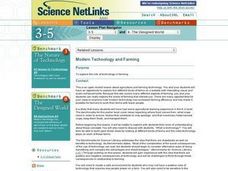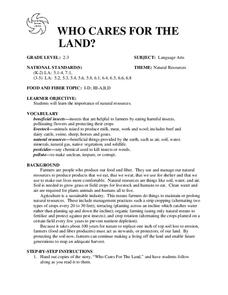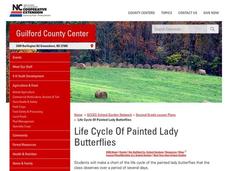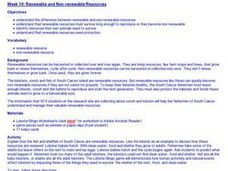Curated OER
Edible GMOs?
The debate over genetically modified organisms is on! Young biologists imagine that they have been asked to choose which corn chips will be sold for a fundraiser, one made with GMOs or one without. This four-day lesson plan requires...
Curated OER
Good Food Explorers
Students use different food items in order to practice the mathematical concept of shape recognition. At the same time the teacher explains how crops are a source of physical health. They use all five senses to describe each food item...
Curated OER
Toward a Sustainable Agriculture
Read about sustainable agriculture and complete related Internet activities. After reading background information about the economics of sustainable agriculture and the problems with the industrial food system, your students click on...
Curated OER
Christmas Tree Farming in Ontario
Young scholars realize that Christmas trees produced in Ontario are a field crop that is harvested annually. They find out that Christmas tree farming is important to the economy and the environment of our province.
Curated OER
Modern Technology and Farming
Learners explore agriculture by conducting a technology conversation in class. In this food system lesson, students identify the path of food from farm to plate and view a virtual farm on the Internet. Learners complete a farming...
Curated OER
Impacting Indiana
Fourth graders explore Indiana. In this Indiana history lesson, 4th graders discuss how Indiana has developed through the years. Students discuss Indiana agriculture and follow a recipe using ingredients from Indiana crops. Students view...
Curated OER
What's Bugging You?
Students examine the effects of pests on other organisms, crops, and the environment. they construct an insect observation chamber and discover how some insects can be pests in some situations and beneficial in others. They write "pest...
Cornell University
Field Day: Be an IPM Detective
Become a pest detective! Individually or in small groups, scholars scout the land to discover which pests—plant and animal—inhabit it, determine whether the pests are endangering the environment, and summarize their findings.
Curated OER
Farming 2: Packaging and Transport
Young scholars explore the special packaging and transport that many foods require to stay fresh during their journey from the farm to people's dinner tables.
Curated OER
The Economics of Organic Agriculture
Young scholars examine how organic agriculture affects farm profitability and how government programs affect organic agriculture. In this organic agriculture instructional activity students complete an activity on costs and returns.
Curated OER
The Economics of Horticultural Production
Students examine how government programs and sustainable practices can affect farm profitability. In this agriculture lesson students complete several activities that include the prices of food and designing their own ecolabel.
Curated OER
LOSING GROUND
Students will observe wind erosion and how crop residue prevents erosion.Point out the three kinds of fields to the students. Do as much or as little instruction as needed to explain the pan with crop residue. Conservation tillage...
Curated OER
Industrial Agriculture
Students write about the benefits that industrial agriculture has had on growing crops. In this industrial agriculture lesson plan, students research how technology has impacted the processing speed of growing food.
Curated OER
WHO CARES FOR THE LAND?
Students explore the importance of natural resources. They are given copies of the story, "Who Cares For The Land," and students follow
along as the teacher reads it. Students identify the key points in the story. (Soil, water and air...
Curated OER
Real People, Real Farms: Case studies of organic agriculture
Eighth graders study examples of organic agriculture from around the country. In this sustainable agriculture instructional activity students apply what they learn to real life situations.
Curated OER
Managing Nutrients in Livestock Manure
Livestock managers reinforce math and science skills while learning about the nutrients found in manure. They predict which animal produces the largest amount and which animal's manure contains the most nitrogen. Finally, they compare...
Curated OER
What In The World Is A Harrow?
Pupils explain the values farming and industry have on the economy of Kansas. They research farm equipment uncluding price, types and purpose. They write a report about farm equipment.
Curated OER
Effect of Acid Rain on Plants
Students observe the effects of acid rain on plants through experimentation and research. Students research types of crops in their area. Students work in small groups to complete the experiments given, as well as write a report and...
Curated OER
Visit The Orchard
Students investigate the technology that is used to harvest apples as a crop. They look at examples of past and present machines. The information is used as inspiration for creating their own device to pick and harvest apples for mass...
NC Cooperative Extension, Guilford County Center
Life Cycle Of Painted Lady Butterflies
The Very Hungry Caterpillar is the inspiration for this project-based learning activity. Kindergartners create a lifecycle chart for a butterfly with four sections: egg, caterpillar, pupa, and butterfly. It is a three-dimensional...
Florida Department of Environmental Protection
Build Your Own Aquifer
Ever wondered how an aquifer works? Introduce your class to the amazing way many people get water by exploring how underground aquifers work. Two fun hands-on activities are used to help kids understand what an aquifer is, how it works,...
Curated OER
It All Starts With a Seed
Students use laboratory equipment safely. They identify structures in a seed. They distinguish between monocots and dicots. They search for information using the computer.
Curated OER
Renewable and Non-renewable Resources
Students play Lobster Bingo on a provided worksheet. This game demonstrates how human activities and natral events affect lobsters by impacting their food, clean water, and shelter of the reef.

























